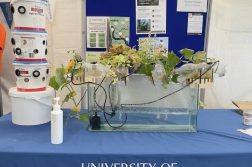The false link between autism and vaccines began in Andrew Wakefield’s investigation into the MMR vaccine. MMR is a combination vaccine, given through two separate injections in early life to protect children from measles, mumps and rubella viral infections. However, Wakefield’s now infamous, fraudulent paper attempted to establish a link between MMR administration and the onset of autism. Unfortunately, the scaremongering generated by Wakefield led to a huge reduction in vaccine uptake globally. Why was the link between MMR and autism made? Was Wakefield right to make this connection? And what does this mean for public trust in vaccines?
Andrew Wakefield was a research scientist who started his early career investigating small intestine transplantation and a potential link between the measles virus and Crohn’s disease (which subsequent studies found to be false). Whilst working at the Royal Free Hospital School of Medicine in the UK, Wakefield set about investigating a potential link between the MMR vaccine and autism onset after being approached by a concerned parent.
In a paper published by The Lancet, Wakefield proposed that the MMR vaccine caused intestinal inflammation in children – summarised as a novel condition he termed ‘autistic enterocolitis’. Wakefield believed that some proteins were able to migrate to, and through, the blood-brain barrier from the intestine, resulting in the autistic phenotype.
Wakefield’s paper was not bold enough to suggest a causal link between vaccine-induced gastrointestinal complaints and autism development. However, in a severe case of ‘science by press conference’, Wakefield made several statements prior to the publication of the paper which fuelled the fire of the MMR scare. He encouraged the use of single vaccines over the combination MMR, stating that: ‘Urgent further research is needed to determine whether MMR may give rise to this complication in a small number of people’ and declared the use of MMR vaccine was now a ‘moral issue’ – pitting the safe development of children against the safety of the vaccine.
Deceit and Bad Science
Following investigations by Brian Deer, journalist of The Sunday Times, an extensive 217-day fitness to practise hearing was conducted by the UK General Medical Council (UK GMC) – and what was discovered is nothing short of shocking. Firstly, the extremely small cohort (12 children) confounded the council, with Wakefield selecting children who had been referred following a diagnosis of gastrointestinal problems – rather than a more acceptable random or stratified sample.
Ethically, Wakefield was questionable at best. The GMC found that Wakefield subjected vulnerable children to invasive diagnostic tests with no indication that such procedures would benefit the children in question, ranging from colonoscopies to lumbar punctures.
Furthermore, the GMC found Wakefield actively falsified data to fit with his presupposed hypotheses. For example, histology samples which were negative for GI complaints were recorded as ‘non-specific colitis’. Moreover, the condition ‘autistic enterocolitis’ was found to be false, with no such condition existing. Five of the children were known to be developmentally challenged before the study, and of the nine who were reported to develop autism, only one showed clear signs of autism onset following independent diagnosis.
Even more damning, Wakefield was found to have financial motives to pursue these data. The research was found to be funded by anti-MMR campaigners, and some of the patient cohort recruited with the aid of lawyers who were paying for said research. Interestingly, before the publication of this study, Wakefield had been developing and patenting his own single measles vaccine. This, of course, would sell for a great profit if someone were to come forward and condemn the safety of the now readily used MMR vaccine. Further, Wakefield had also been developing diagnostic tools for his fairy-tale ‘autistic enterocolitis’ condition – again, this would have benefited him massively if his paper were to confirm the existence of such a condition.
Origins of the "Vaccines cause autism" hoax. In 1998, Andrew Wakefield released a paper claiming to have linked the measles, mumps, and rubella (MMR) vaccine to the onset of autism. His work has since been described as “the most damaging medical hoax of the last 100 years." pic.twitter.com/cbewEqGLJW
— Dr. Melvin Sanicas 🩺🔬 (@Vaccinologist) January 24, 2019
The Fallout from Wakefield’s Fraud
Immediately following the investigative work by The Sunday Times and the UK GMC, Ten of the 13 co-authors of the Wakefield paper retracted their involvement in the ‘interpretation’ section of the study. Wakefield lost his place on the UK medical register and was banned from practising as a physician. However, the fallout from this study was to be much more far-reaching than was first imagined.
The lasting impact of this scandal is seen with a gross reduction in vaccine uptake and an increase in the infections that would otherwise have been protected by the MMR vaccine. For example, in 2017, WHO stated that the UK had eliminated circulating measles infections; this status was then lost in 2018 following a massive spike in new cases. Furthermore, WHO have calculated that globally, measles cases have increased from 173,330 (2017) to 307,714 cases (2018).
There have been many studies confirming no link between MMR and autism. One such study, carried out by the Statens Serum Institut and the University of Copenhagen, looked at 657,461 children born between 1999 and 2010 and followed them from 1 year old until August 2013. Out of the total cohort, 6,517 were diagnosed with autism, leading to the conclusion that the MMR vaccine does not increase the risk of autism any more than not having the vaccine does.
In conclusion, there is no link between the MMR vaccine and autism. The fraudulent work of Wakefield has had disastrous consequences in terms of global health and worked against the positive progress vaccines were making up until its publication. Perhaps, the attention of this false link should be shifted onto the understanding of autism. Rather than stigmatising autism as a negative which should be avoided at all costs – in the hands of anti-vaxxers, even at the cost of a fatal viral infection – we should instead work to develop an awareness of this condition, and nurture those with autism into a working and educated society.



